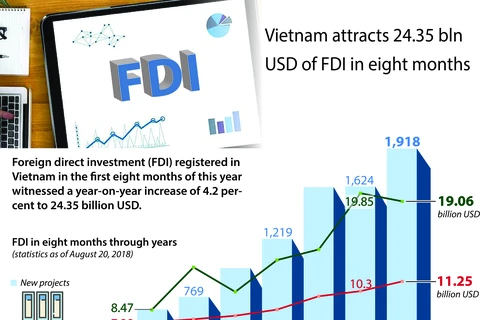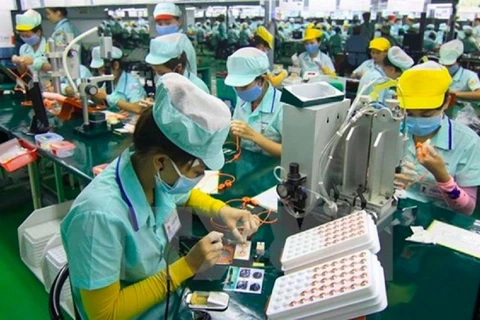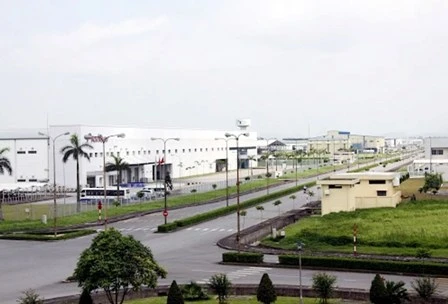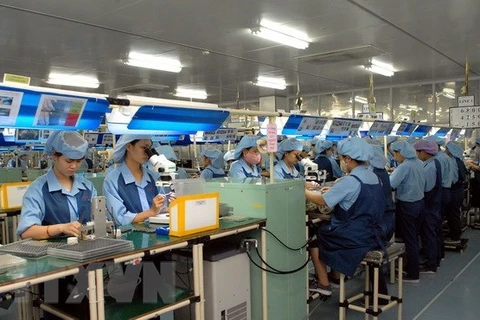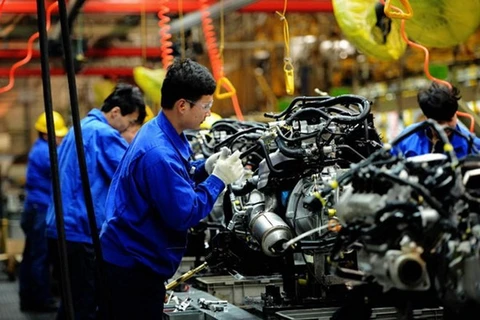The economist has granted an interview to the Vietnam News Agency on several FDI-related issues.
Question: Please kindly assess the general impacts of FDI inflows towards Vietnamese economy in the last 30 years.
Answer: So Vietnam has been quite successful in attracting FDI ever since the country opened up to foreign investment and if we look at the impact, we can say that FDI has really contributed in various ways, including industrialization, where a lot of investment went into manufacturing sector, building capacity across a range of sectors including electronics but also more traditional industries such as garment and shoe factory, and so on, really fueling Vietnam strong export performance and also creating jobs, higher productivity, better paying jobs, hundreds of thousands of them directly and of course also indirectly, by then creating demand for services, for construction, for even agriculture products that are used to supply some of these factories.
So I think it’s a very successful part of Vietnam’s overall economic development over the last 3 decades.
Question: What do you think about Vietnam’s potential for FDI attractions compared to other countries in the region?
Answer: Vietnam is definitely one of the leaders in the region in terms of whether you look at the FDI for capital, you look at FDI as a share of GDP, Vietnam is performing quite well. It also attracted FDI across a quite diversified set of economic activities. About 12,000 different firms are operating here, either producing or of course also you have companies that are here to sell products to the Vietnamese market. So there is a lot of inflows and Vietnam has been quite successful.
Now what is important to note though is that a lot of this investment is currently in labour intensive with relatively low skills, final assembly so Vietnam is competitive in one particular part of the value chain where the value added per worker is relatively low, because a lot of the components are imported, and Vietnam is only doing the final assembly.
So I think there is still in the agenda in terms of moving to the next level of attracting different types of FDI, diversifying across the value chain and particularly moving into higher value component of the value chain, being R&D or downstream issues like marketing and brand development. That adds a lot more value and would generate higher benefit to the economy of Vietnam.
Question: What is the main reason that makes Vietnam still unable to move up or down the value chain?
Answer: Vietnam has successfully entered the global value chain, and it is doing that at the rate/level that’s more successful than other countries in the region but also if you look at countries at the level of Vietnam’s income. So it’s more of the continuance, now that you have participated and integrated into global value chain, it is important to use that and to build on that and to reach the full potential.
I think Vietnam is not underperforming but it needs to continue to become more competitive, that means investing in skills, and in infrastructure, good connected infrastructure particularly, because how quickly you can import and export goods is absolutely critical in the value chain that depends on very tight and timely supply chain.
So it’s important to have such infrastructure, both physical infrastructures, meaning ports, roads rail and transport network, but also soft aspects such as border clearance and so on, so that’s absolutely critical. And finally of course investing in skills so Vietnam’s workforce has been a big factor in attracting FDIs, because the workforce is relatively young, more than half of the population are below 35, the workforce is growing, Vietnam is doing well in certain aspect of the education system, but I think if you want to compete at higher level it’s important to have, for example, a good vocational training so you can skill up the workforce so that Vietnam has the people that can perform higher value jobs. That’s really the agenda for Vietnam going forward.
Question: Over the last 30 years, Vietnam has actively improved its business environment in order to attract more foreign investment. How do you assess the results achieved from this and please kindly analyze the challenges that Vietnam is facing on this matter?
Answer: If we look at what are the ingredients why Vietnam has being successful so far we can say that there are some natural advantages, geographic location, and as I mentioned, the population. What Vietnam did quite well is capitalizing on those fundamental advantages it has, and it did so by, first of all, liberalizing trade, I think what Vietnam has done extremely well is opening up to trade, of course the WTO access in 2007 and also several multi and bilateral trade agreements, in fact, more agreements than any other economies in East Asia except for Singapore. So Vietnam is really one of the most open economies, most investor and trade friendly economies in the world and that’s a critical element of why Vietnam has been successful.
At the same time, Vietnam has focused on the investment and business environment by reducing hurdles to investment, hurdles to business operations, and lowering taxes improving taxes administration, improving border and custom clearance procedure and so on, if we look and see for example in Vietnam’s progressive improvement in doing businesses rating at the WB. Now if you look at the same rating that Vietnam still has room to improve, both in terms of the overall rating but also in certain aspects more than the others for example paying taxes. Despite the progress, Vietnam is still not performing at the level it could perform, for example insolvency procedures, meaning how quickly you can liquidate firms that are no longer profitable and free up the resources like capital, labour that are locked in these firms. It is important that this performance continues and I think the government has made it a clear priority to cut red tape, to streamline procedures, to get rid of those procedures that may not be needed, and to implement that are needed in a more efficient and firm friendly way so that regulations do not cause unnecessary burden on firms.
Question: Trying to attract FDI, countries are facing constraints such as transfer pricing, tax evasion or even negative environmental impacts, please advise us on how to resolve this problem?
Answer: For that you need smart regulations. I think that’s absolutely correct. I think if you have an expanding growing economy that is increasingly sophisticated that has a lot of interaction financial and real interactions with the outside world that poses a challenge and requires regulations to be adapted. For example as you mentioned transfer pricing, we know that is an issue for multinational operation and multinational operation invests a lot in having tax advice that helps them to minimize the tax burden across different jurisdictions.
It’s important that you have a good leader framework to tackle all those issues, so it’s predictable for firms in the one hand but also empowering the authority to prevent tax avoidance or profit shifting that basically erode the tax base here. Because you are now having about 18% of GDP is foreign firms in Vietnam and you need to make sure that those firms pay the tax they are due and the level of playing field between those enterprises and domestic firms. So you need a good legal regulatory framework and good capacity in tax service so you have to specialize, that’s what we see in many countries basically have specialised offices in the tax service that deal with these large enterprises, those tend to have very complex tax declaration, and that need very sophisticated analysis to ensure they pay their due share to the tax system here in Vietnam.
Question: And your advices on the environmental issue?
Answer: That’s of course very important. I would say the key is to have good environmental regulations and also again good inspection, good enforcement of these regulations. That should apply equally to foreign enterprises and to domestic enterprises. And of course Vietnam can. I think now it’s part of its move to higher value activities should also increasingly take into account the cleanliness of those industries. So Vietnam I think has a comparative advantage that is strong enough to actually attract the industries of the future and to may be avoid some of the dirty industries, and I think that would be more sustainable not only environmentally but also economically, because we know increasingly that basically good environmental management is also good economic management.
Question: The world economy is entering the 4th Industrial Revolution era and like some other countries, Vietnam is looking forwards to attracting top foreign investors in the information technology sector. In your opinion, what should we do to complete this mission?
Answer: The 4th Industrial Revolution I think is widely seen as impacting some of the industries in which Vietnam has traditionally been quite successful. I think there are concerns not only here in Vietnam but more generally that technological changes over time will modernise manufacturing and basically make some of the labour intensive manufacturing redundant and therefore there are some risks in terms of jobs and so on. So I think for Vietnam [we need to] again invest in skills. We know that technological progress is of course a good thing, if we look at the history and I think there is good reason to be optimistic that the 4th Industrial Revolution, like the other industrial revolutions, will actually improve life for millions of people, but it is important to prepare people with the right skills so they can find jobs and productive employment that complement these technologies rather than compete with technology. I think investing in good education, especially science technology, and math education is important because those are really the skills that I think will be in demand in the future.-VNA

